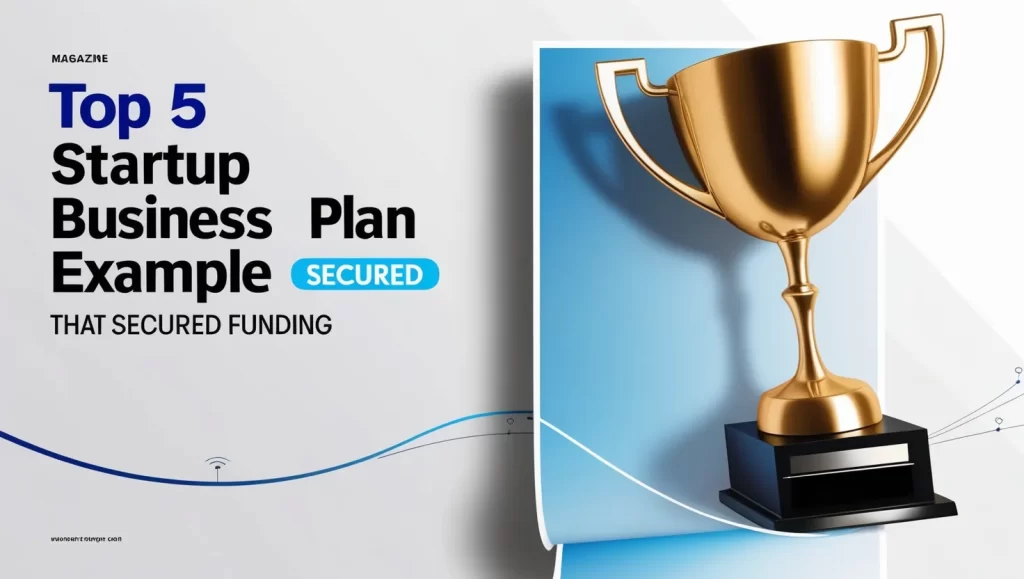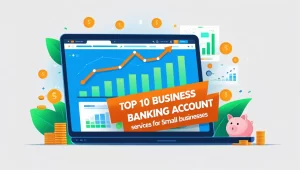Top 5 Startup Business Plan Example That Secured Funding

Top 5 Startup Business Plan Example That Secured Funding-Securing funding is one of the most critical challenges for any new startup. One of the most effective ways to impress investors is by presenting a well-structured business plan that clearly outlines your vision, market opportunity, and financial projections. In this article, we’ll explore five standout startup business plan examples that secured funding and helped propel these companies to success.
1. Airbnb: A Startup Business Plan Example in the Hospitality Industry

When Airbnb first launched, its founders used a detailed and compelling startup business plan example to secure funding. The plan highlighted a gap in the hospitality industry: a growing demand for affordable, personalized, and non-traditional accommodations. Airbnb’s business plan included clear financial projections, a robust marketing strategy, and a roadmap for scaling. The startup business plan example showed investors how the company planned to build trust with customers and hosts, an essential element for success in the early days.
By focusing on a user-friendly platform, customer feedback, and the sharing economy model, Airbnb was able to secure initial seed funding, eventually growing into the global giant it is today. The company’s clear vision and scalable business model stood out in the crowded travel space, attracting major investors who were excited about the potential of disrupting the traditional hotel industry.
2. Dropbox: A Strong Startup Business Plan Example in the Tech Industry
Dropbox is a prime example of a tech startup that secured funding with a compelling startup business plan example. The company’s founders, Drew Houston and Arash Ferdowsi, initially struggled to find investors. However, after refining their business plan, they were able to showcase the massive potential of cloud storage and collaboration tools. Their startup business plan example focused on simplicity, accessibility, and the growing need for businesses and consumers to store and share data remotely.
In the plan, Dropbox included detailed financial projections, outlined its go-to-market strategy, and explained the company’s scalable model. This comprehensive and well-thought-out business plan eventually caught the attention of investors, leading to millions in funding. Dropbox’s ability to make complex technology user-friendly was a key factor that helped differentiate the business and attract funding from big names in venture capital. (Read More: Overcoming Obstacles: Startup Business Funding Bad Credit Options)
3. Uber: A Startup Business Plan Example That Revolutionized Transportation

Uber’s journey from a startup to a global leader in transportation was largely fueled by a solid startup business plan example that resonated with investors. The company’s founders identified a major gap in the taxi industry: unreliable service and inefficient transportation options. Their business plan focused on offering a more convenient, affordable, and flexible ride-sharing service, which was backed by technology that provided both drivers and riders with a seamless experience.
The startup business plan example highlighted Uber’s ability to leverage technology, customer satisfaction, and data analytics to create a scalable business. With clear projections on revenue growth, the business plan showcased how Uber could expand rapidly across cities and eventually worldwide. Investors recognized the disruptive potential, which led to Uber securing funding that allowed it to dominate the ride-sharing market. (Read More: 5 Key Benefits of Using a Startup Business Line of Credit in 2025)
4. Warby Parker: A Startup Business Plan Example That Disrupted Eyewear
Warby Parker’s startup business plan example focused on revolutionizing the eyewear industry, which was traditionally dominated by a few major players. The company’s founders wanted to make eyeglasses more affordable and accessible while maintaining high-quality design. Their business plan emphasized the power of an online retail model combined with a home try-on program, which was a key differentiator at the time.
The Warby Parker startup business plan example also highlighted its commitment to social impact, with the company pledging to donate a pair of glasses for every pair sold. Investors were drawn to the unique business model, which combined profitability with social responsibility. The startup’s business plan also outlined clear financial projections and a growth strategy that promised strong returns. This combination of innovation and social impact helped Warby Parker secure millions in funding and become a disruptor in the eyewear industry. (Read More: How to Get Startup Business Funding Bad Credit Doesn’t Stop You)
5. Square: A Startup Business Plan Example That Made Payment Processing Simple
:max_bytes(150000):strip_icc()/business-plan-on-note-pad-985119814-5bfdc53946e0fb0026a7875b.jpg)
Square’s founders, Jack Dorsey and Jim McKelvey, created a startup business plan example that focused on simplifying payment processing for small businesses. At the time, credit card payment systems were costly, complex, and inaccessible for small merchants. Square’s business plan explained how the company could offer an easy-to-use, affordable solution with a small card reader that plugged into smartphones and tablets.
In their startup business plan example, Dorsey and McKelvey demonstrated the growing need for accessible payment systems, especially for small business owners and freelancers. They highlighted the scalability of the model, the ease of implementation, and the potential to capture market share in a vast, underserved market. The simplicity and effectiveness of the business model, paired with clear financial projections, helped Square secure substantial funding, leading to rapid expansion and success.
By focusing on the pain points of their target market, these founders were able to convince investors that their businesses had long-term potential. Square’s clear, concise business plan also outlined its plans for growth, which reassured investors and led to early funding rounds that were critical to the company’s development.
Each of these startup business plan examples stands as a testament to the importance of a well-crafted plan in securing funding. Whether it’s offering an innovative service, addressing a market gap, or focusing on scalability, these companies were able to successfully present their vision and attract investment. If you’re looking to secure funding for your own startup, taking inspiration from these winning business plans could give you the edge you need to succeed.





